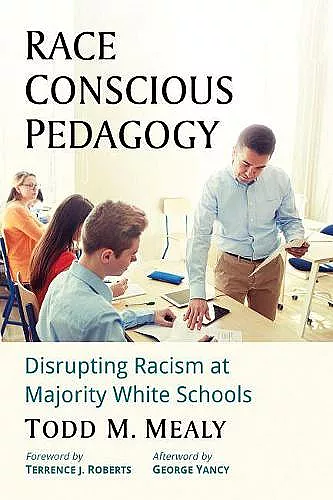Race Conscious Pedagogy
Disrupting Racism at Majority White Schools
Format:Paperback
Publisher:McFarland & Co Inc
Published:30th Oct '20
Currently unavailable, and unfortunately no date known when it will be back

In 1935, W.E.B. Du Bois asked, "Does the Negro need separate schools?" His stunning query spoke to the erasure of cultural relevancy in the classroom and to reassurances given to White supremacy through curricula and pedagogy.
Two decades later, as the Supreme Court ordered public schools to desegregate, educators still overlooked the intimations of his question. This book reflects upon the role K-12 education has played in enabling America's enduring racial tensions. Combining historical analysis, personal experience, and a theoretical exploration of critical race pedagogy, this book calls for placing race at the center of the pedagogical mission.
“This is the book we need. Teachers are increasingly asking how to effectively grow critical racial consciousness in the classroom, especially among white students and in predominantly white spaces. Todd Mealy answers with clarity, conviction and concrete strategies. Race Conscious Pedagogy speaks to multiple tiers—theoretical and curricular, classroom and systems. His belief that public schools can be vehicles of liberation comes through on every page and his skill at enabling the rest of us to imagine we can be part of educational movements to get us there is nothing less than a gift. For the good of all students, the sake of racial justice, indeed, the well-being of our democracy, read this fantastic book.”—Jennifer Harvey, Ph.D., Drake University, author, Raising White Kids: Bringing Up Children in a Racially Unjust America
“Race Conscious Pedagogy adds an essential resource to the growing body of literature for educators interested in equity and access for all. Combining the step-by-step how’s of rolling out a race conscious pedagogy course with the historically rooted why’s, as well as setting expectations around the opportunities and challenges implementers of his curriculum will likely face, Mealy does what all great educators do--sets his learners up for success.”—Debby Irving, author Waking Up White
“Discussing race in the classroom is not always the easiest task to pursue for many educators. Imagine facilitating a course based on Critical Race Theory to a group of predominately White students in a rural high school. Dr. Todd Mealy paints a vivid picture of the importance of teaching students to be socially just and informed citizens. If we are truly concerned about the future of our youth and creating equitable opportunities for all students, we must begin to critically approach the connection between race and our society. This book discusses the significance of engaging in difficult conversations about race to White students and why we should not avoid these discussions because they may make us feel uncomfortable. Instead, we must be willing to engage in conversations about race and privilege to bring more awareness to the societal imbalances impacting our communities.”—Sheldon L. Eakins, Ph.D., director of the Leading Equity Center and host of the Leading Equity Podcast
“The ‘problem of the twentieth century’—racism and the entrenchment of a ‘color-line’—that W. E. B. Du Bois famously declared remains with us into the present century. Pointing to education as a key to increasing awareness and reform is hardly new, but what is especially significant in Mealy’s smart, inspiring book is centering race in pedagogy across the curriculum. It gives insight into raising voices in and outside the classroom to value difference in teaching and learning, to center race as crucial to everyday experience, and indeed to envision change. More than an ivory-tower proposal, the pedagogy, indeed the outlook, here emanates from Mealy’s years of experience in schools and broad academic insight into building a culture of diversity, equity, and inclusion.”—Simon J. Bronner, Ph.D., Dean of the College of General Studies, University of Wisconsin-Milwaukee; “Anyone interested in racial justice should read this work!”—Dr. Brittany Aronson, P.hD., Miami University of Ohio.
ISBN: 9781476680330
Dimensions: 229mm x 152mm x 12mm
Weight: 318g
232 pages